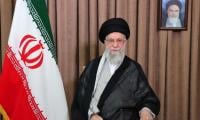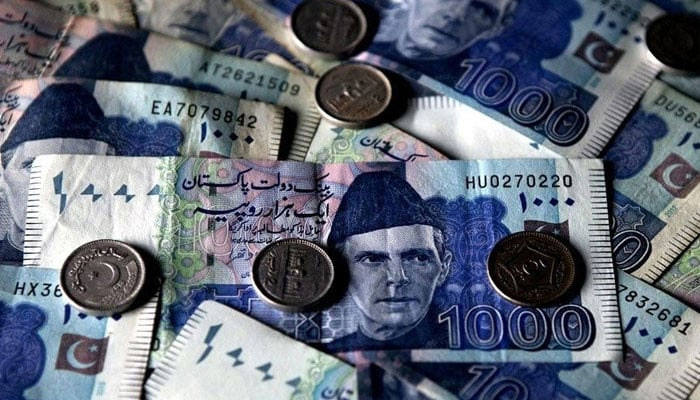Solvency or stability?
For now, IMF agreement provides essential cushion to help Pakistan return from the brink of Sri-Lanka-type default on foreign repayments
As Pakistan begins a new year today, its ability to lift its future prospects lies largely in solving a tough riddle. The past year has mostly witnessed the current government in Islamabad oversee a return to solvency, at best remaining afloat steered by a $7 billion IMF loan for the next three years.
For now, the IMF agreement provides an essential cushion to help Pakistan return from the brink of a Sri-Lanka-type default on foreign repayments. But solving the riddle facing Pakistan requires facing a host of difficult challenges, best encapsulated within the framework of the country’s national security, unsettled politics and an economy which has so far failed to be reformed. Together, unresolved challenges on all three fronts have weakened Pakistan’s outlook as never before.
The closing days of 2024 witnessed sporadic protests in parts of Pakistan led by demonstrators seeking the government’s immediate intervention to tackle a reportedly mounting humanitarian crisis in the northern Kurram agency. The area which centers around Parachinar on the Afghan border, has remained a recurring flashpoint for bloody conflict for decades.
Though seemingly a conflict between rivals belonging to different sects, the crisis has nevertheless been fuelled by tribal rivalries and turf wars. The latest conflict was triggered in late November when more than 40 people from the area were killed in an audacious terrorist attack.
Residents of Kurram agency claim that they remain surrounded by heavily armed opponents, determined to shoot anyone venturing out in the open. The government’s failure to enforce the writ of the state through enforcing the law while providing relief to the natives of Kurram agency has further reinforced a weak rule of law.
The past year witnessed recurring attacks by Afghanistan-based militants, leading to multiple casualties of Pakistan’s army personnel and civilians in regions along the Afghan border. In December, Pakistan reportedly carried out rare attacks inside Afghanistan targeting terrorists tied to attacks inside Pakistan. That muscular gesture came in tandem with Islamabad continuing to extend repeated olive branches to the rulers of Kabul, urging them to target militants inside their territory who cause harm to Pakistan.
Though such targeting may well work in the short term, Pakistan’s ability to force its next-door neighbour to proactively close down the Pakistani Taliban’s camps on their terrain ultimately depends on Islamabad’s success in stabilising its internal conditions. The recurring conflict between prime minister Shehbaz Sharif’s government and the opposition led by jailed former prime minister Imran Khan has already jolted Pakistan during the past year.
A pattern of the PTI’s repeated push to undertake protests in central Islamabad has witnessed Sharif’s government respond harshly. At best, this may be a very short-term solution. An enduring solution requires a solution to a drawn-out controversy.
Since the last parliamentary elections in February 2024, Khan and the PTI have repeatedly protested the results calling them a consequence of behind-the-scenes rigging. The resultant uncertainty and repeated clashes continue to undermine a badly needed return to national unity and brighter prospects for the economy.
Pakistan’s future journey requires settling the country’s political discord and undertaking unprecedented economic and societal reforms. In the past year, Sharif’s government promised to turn the last IMF loan approved in 2024 as Pakistan’s last-ever access to the Washington-based lender. That will be far easier said than done.
Taking Pakistan towards a different economic trajectory requires major reforms, notably unprecedented tax reforms, cutting expenditure aggressively and a push to eventually turn the international trade deficit into a surplus. But reforming the tax collection system has repeatedly before remained a mere lip service under successive governments.
Ultimately, a robust push to reap more tax revenues is essential for the government to eventually begin tackling a stubborn domestic and international debt. This will require stepping on powerful toes with strong connections to the ruling structure.
Yet, Pakistan’s very future must depend upon targeting every Pakistani with financial means, irrespective of their clout. Similarly, tackling a stubborn international trade deficit requires emergency steps to boost Pakistan’s farm production as a way to ensure food security and lower costs of food imports. In tandem, Pakistan must boost its industrial output while also stepping back from wasteful expenditures such as more roads and an ill-advised glass-covered train at the centre of the government’s obsession.
Arming the state with more resources through larger tax collections must precede an urgent push to tackle Pakistan’s widespread social problems, best illustrated through the powerful reality of up to 40 per cent of the country’s population or almost 100 million people living below the poverty line. This is a ticking time bomb that must no longer be ignored. It must be addressed before Pakistan’s community of the dispossessed stands up to forcibly grab their rights.
Short of sweeping reforms and decisive action in 2025, the year ahead will become equally if not more inconsequential than the year gone by.
The writer is an Islamabad-based journalist who writes on political and economic affairs. He can be reached at: farhanbokhari@gmail.com
-
 Kelly Osbourne's Mom Sharon Receives 'shut Up' Call Accepting An Award For Late Hubby?
Kelly Osbourne's Mom Sharon Receives 'shut Up' Call Accepting An Award For Late Hubby? -
 Claude Overtakes ChatGPT On Apple App Store After Pentagon Dispute
Claude Overtakes ChatGPT On Apple App Store After Pentagon Dispute -
 What Happened To Ayatollah Ali Khamenei's Family During US -Israel Attack On Iran
What Happened To Ayatollah Ali Khamenei's Family During US -Israel Attack On Iran -
 BRIT Awards 2026 Winners Revealed
BRIT Awards 2026 Winners Revealed -
 Shia LaBeouf Arrested Again In New Orleans On Additional Battery Charge
Shia LaBeouf Arrested Again In New Orleans On Additional Battery Charge -
 Shamed Andrew Upset With THIS Family Member Over Current Condition
Shamed Andrew Upset With THIS Family Member Over Current Condition -
 Michael Jackson Estate Sued With Allegations Of Years Of Abuse From Late Singer
Michael Jackson Estate Sued With Allegations Of Years Of Abuse From Late Singer -
 Meghan Markle Shows ‘real Pain’ With Her Body Language In Jordan
Meghan Markle Shows ‘real Pain’ With Her Body Language In Jordan -
 Jennifer Garner Names Her Movie That She Hasn't Seen In Full Since Its Premiere
Jennifer Garner Names Her Movie That She Hasn't Seen In Full Since Its Premiere -
 Bridgerton’s Michelle Mao On Facing Backlash As Season Four Antagonist
Bridgerton’s Michelle Mao On Facing Backlash As Season Four Antagonist -
 King Charles Gets New ‘secret Weapon’ After Andrew Messes Up
King Charles Gets New ‘secret Weapon’ After Andrew Messes Up -
 Shia LaBeouf Makes Bold Claim About Homosexuals In First Interview After Mardi Gras Arrest
Shia LaBeouf Makes Bold Claim About Homosexuals In First Interview After Mardi Gras Arrest -
 Princess Beatrice, Eugenie ‘strained’ As They Are ‘not Turning Back’ On Andrew
Princess Beatrice, Eugenie ‘strained’ As They Are ‘not Turning Back’ On Andrew -
 Benny Blanco Addresses ‘dirty Feet’ Backlash After Podcast Moment Sparks Online Frenzy
Benny Blanco Addresses ‘dirty Feet’ Backlash After Podcast Moment Sparks Online Frenzy -
 Sarah Ferguson Unusual Trait That Confused Royal Expert
Sarah Ferguson Unusual Trait That Confused Royal Expert -
 Prince William, Kate Middleton Left Sarah Ferguson Feeling 'worthless'
Prince William, Kate Middleton Left Sarah Ferguson Feeling 'worthless'




